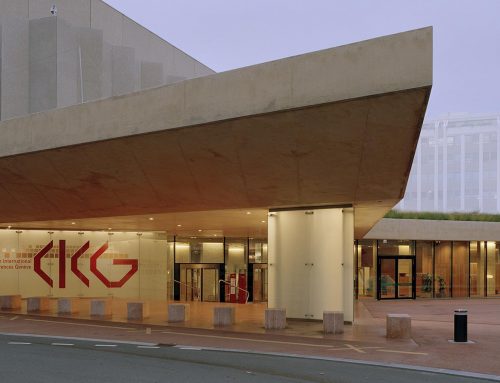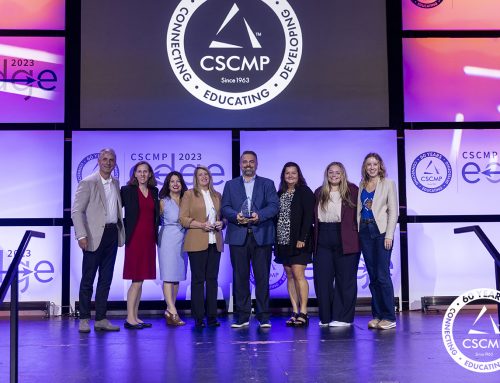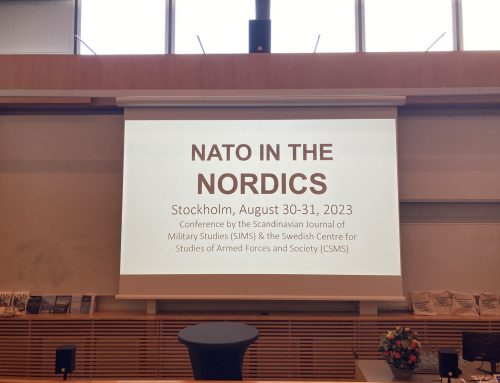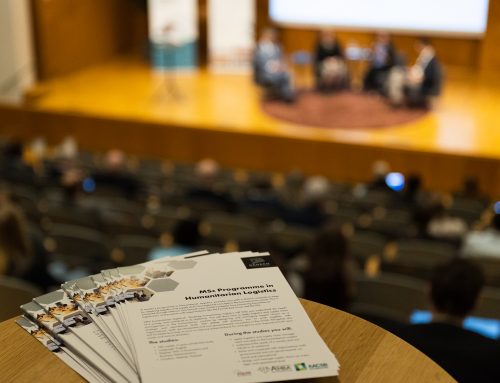LOGY Conference, joka järjestetään vuosittain Suomen Osto- ja Logistiikkayhdistyksen (LOGY) toimesta, on erittäin odotettu kansainvälinen tapahtuma, joka tarjoaa korvaamatonta tietoa ammattilaisille eri aloilta, kuten liiketoiminnan johto, toimitusketjujen hallinta, hankinta, intralogistiikka, materiaalinkäsittely, kuljetus ja logistiikka.
Noin 500 osallistujallaan LOGY Conference toimii huippufoorumina verkostoitumiselle ja tiedonvaihdolle, houkutellen osallistujia johto- ja johtotehtävistä, jotka kattavat yli 75% osallistujista. Se tarjoaa foorumin pysyä ajan tasalla nykyisistä teollisuuden trendeistä, osallistua muiden ammattilaisten kanssa sekä vuorovaikuttaa ajattelijoiden ja trendienasettajien kanssa alalla.
Tänä vuonna tapahtuma pidettiin 8. ja 9. helmikuuta Helsingissä ja Tallinnassa. Ensimmäinen seminaariosa, joka järjestettiin Pikku Finlandia -tapahtumakeskuksessa Helsingissä 8. helmikuuta, käsitteli aiheita kuten kilpailukyky, toimitusketjujen hallinta ja logistiikkapalvelujen kehittäminen. Tämän jälkeen tapahtuma jatkui risteilyllä Tallinnaan, Viroon, missä osallistujilla oli mahdollisuus verkostoitua yöpyessään Nordic Forum Hotelissa tai osallistumalla LOGY Conference Contact Forum -tapahtumaan seuraavana päivänä.
LOGY Conference sisälsi myös erityisen kohokohdan: Dr. Karen Spens julistettiin vuoden 2023 logistikoksi vuosittaisessa LOGY Conference -tapahtumassa Helsingissä.
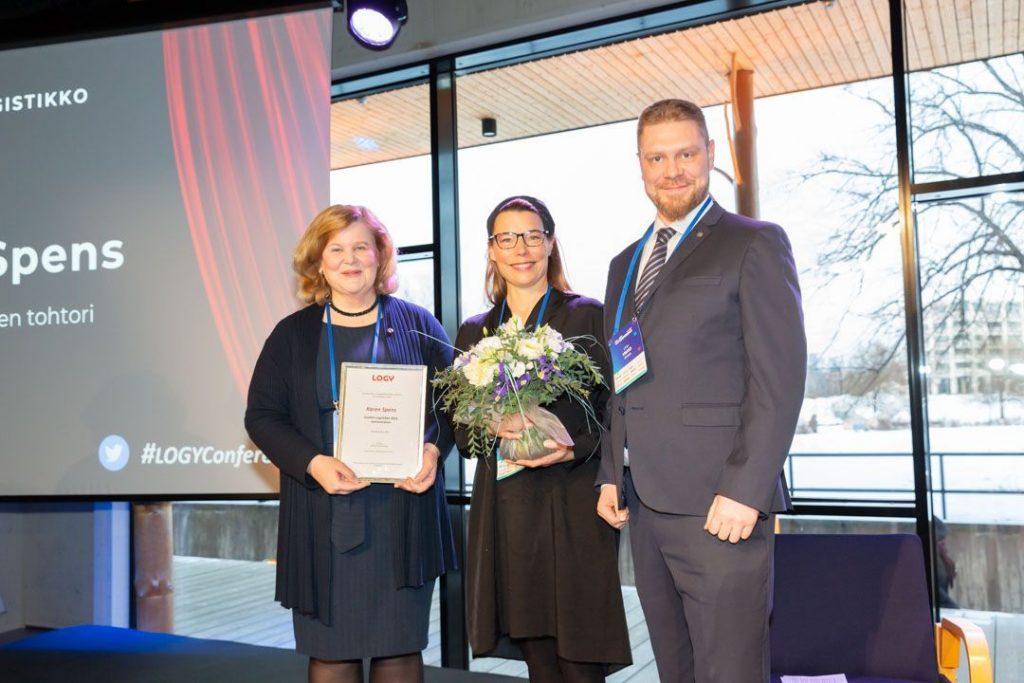
Karen Spens tunnetaan merkittävistä panoksistaan logistiikan tutkimusyhteisöön Suomessa sekä omistautumisestaan humanitaarisen logistiikan tutkimuksen ja koulutuksen edistämiseen. Hänen tutkimuksensa keskittyy pääasiassa humanitaariseen logistiikkaan, mikä on johtanut useiden kirjojen julkaisemiseen ja Journal of Humanitarian Logistics and Supply Chain Management -lehden sekä Humanitarian Logistics and Supply Chain Research Institute (HUMLOG Institute) -instituutin perustamiseen. Nykyään HUMLOG-instituutti on yksi johtavista tutkimuslaitoksista humanitaarisen logistiikan alalla, ja se tekee laajaa yhteistyötä teollisuuskumppaneiden, kansalaisjärjestöjen ja yliopistojen kanssa.
Useiden suurten tutkimusapurahojen avulla humanitaarisen logistiikan ala on sittemmin saanut merkitystä laajemmassa logistiikan alalla. Dr. Spens on toiminut monien kirjojen, kirjan lukujen ja artikkeleiden yhteistyökumppanina useissa lehdissä, mukaan lukien logistiikkaa ja siihen liittyviä aloja, kuten katastrofitutkimuksia.
Hän on myös toiminut International Journal of Physical Distribution and Logistics Management -lehden toimittajana sekä monien merkittävien logistiikkajulkaisujen toimitusneuvostoissa. Dr. Spens on edistänyt humanitaarisen logistiikan tutkimusta ja yhteistyötä vierailevan tutkijan rooleissa BI:ssä (Norja), MIT:ssä (USA), Clark Universityssä (USA) ja Griffith Universityssä (Australia). Lisäksi hän on ollut mukana lanseeraamassa Business Lead -ohjelmaa, joka on tarkoitettu korkeasti koulutettujen maahanmuuttajien ja pakolaisten integroimiseen suomalaiseen liiketoimintakulttuuriin. Ohjelman menestystä, joka on palkittu kansainvälisillä palkinnoilla, kuten EFMD Excellence in Practice (EiP) -kultamitalilla, esitteli Dr. Spens Maailman talousfoorumissa (WEF) Davosissa vuonna 2019.
Karen Spens suoritti tohtorin tutkinnon liiketoimintataloudesta Hankenin kauppakorkeakoulussa vuonna 2001. Hän toimi Hankenin koulutusdekaanina vuosina 2010–2015, valvoen oppimisen vakuuttamisprosessin kehittämistä, joka tähtää opiskelijoiden oppimistulosten parantamiseen. Lisäksi hän toimi Hankenin kauppakorkeakoulussa toimitusketjujen hallinnan ja yritysmaantieteen professorina. Syksystä 2022 lähtien hän on toiminut presidenttinä BI Norwegian Business Schoolissa.
Vuoden 2023 logistikoksi nimetyn Karen Spensin palkinnon luovuttivat LOGYn palkintokomitean puheenjohtaja Anna Aminoff ja LOGYn hallituksen puheenjohtaja Jyri Vilko.
Dr. Spens piti seuraavan puheen saadessaan vuoden 2023 logistiikkopalkinnon LOGYn vuotuisessa konferenssissa:
“Hyvät naiset ja herrat, arvoisat seminaarivieraat,
Vuonna 2004 tsunami iski Kaakkois-aasiassa ja tänä vuonna on siis 20 vuotta tästä suurkatastrofista. Tämä tapahtuma on vieläkin monien suomalaisten sekä monien muiden maiden kansalaisten mielessä, se oli järkyttävä ja monella tapaa niin monia koskettava tapahtuma. Vuonna 2006 kollegaani kurkisti ovestani Hankenilla ja kysyi minulta että mistä haluaisin kirjoittaa seuraavaan NOFOMA konferenssiin. NOFOMA on suurin Pohjoismaiden logistiikan alan tutkijoiden konferenssi joka sinä vuonna järjestettiin BI kauppakorkeakoulussa Norjassa. Sanoin kolleegalleni että haluaisin kirjoittaa jostakin josta ei tiedetä jurikaan mitään, ja niin hän kysyikin minulta, oletko kuullut humanitaarisesta logistiikasta? Ja vastasin että en tiedä siitä yhtään mitään.
Näin ollen päätimme kirjoittaa humanitaarisesta logistiikasta artikkelin. Siihen aikaan ei todellakaan ollut montaa artikkelia kirjoitettu, löysimme ainoastaan pienen määrän joissa sanaa oli käytetty. Päätimme siis kirjoittaa siitä ja näin sai , sittemmin 2007 julkaisema ensimmäinen artikkelimme Humanitarian logistics in disaster relief operations alkunsa. Artikkelissa kerroimme siitä mitä tsunamin aikana tapahtui, tai ehkä eniten siitä mitä ei tapahtunut, ja miksi niin monessa asiassa epäonnistuttiin logistisesti.
Sekä NOFOma paperi että esityksemme keräsi paljon huomiota ja artikkeli voittikin parhaan paperin palkinnon konferensissa. Kaikkein parasta antia konferenssin jälkeen oli kuitenkin se että tämä oli lähtölaukaus yhteistyöhön monien eri toimijoiden kanssa, sekä kansainvälinen punainen risti että UNICEF lähtivät nopeasti mukaan yhteistyöhön koska heillä oli suuri tarve saada tutkimustietoa siitä miten voitaisiin koordinoida paremmin työtä kentällä jotta käytettäisiin vähemmän rahaa logistiikkaan ja näin ollen enemmän rahaa kärsivien ihmisten auttamiseen.
Tämä ajatus onkin sittemmin ollut johtotähti humanitaarisen logistiikan saralla, miten voimme käyttää parhaiten hyväksi niitä keinoja ja menetelmiä joita löytyy jotta pystytään käyttämään rahaa ja muita resursseja parhaimmalla mahdollisella tavalla avustustyöhön. Sittemmin Yhteistyö kansainvälisten toimijoiden kanssa tiivistyi ja vuonna 2008 perustimme humanitaarisen logistiikan instituutin kauppakkorkeakoulu Hankenille, yhteistyössä Maanpuolustuskorkeakoulun kanssa. Projektien kautta, joista monet kansainvälisiä, saimme tunnustusta ja kohta perustimmekin ensimmäisen humanitaarisen logistiikan tieteelllisen julkaisun. Kaikkein hienointa minulle kuitenkin tässä työssä oli se että, lääkärin tyttärenä, koin että meidän työllä sekä yhteistyöllä oli todella merkitystä.
Humanitaarisen logistiikan instituutti on kuin onkin tänä päivänä yksi maailman tunnetuimmista alan tutkimuskeskuksista. Maailman ensimmäinen logistiikan professori on siellä töissä, ja hän onkin se nuori tutkija joka kurkisti ovestani vuonna 2006, Gyöngyi Kovács. Olen erittäin ylpeä siitä työstä mitä instituutissa on tehty ja mitä siellä ollaan saatu aikaan. Viimeksi pandemian aikana he tekivät paljon tutkimustyötä rokote-logistiikan saralla suuressa EU projektissa, ja instituuttiin hakeutuu moni tutkija koska haluaa tehdä töita ja opiskella humanitaarista logistiikka Suomessa.
Itse en valitettavasti ole kovin paljon viime vuosina ehtinyt tehdä tutkimustyötä. Se jäi aika paljon takalallee kun siirryin niin sanotusti ”over to the dark side” eli aloitin rehtorina Hankenilla 2015. Ymmärtääkseni olin silloin ensimmäinen logistiikan alan professori joka valittiin rehtoriksi. Näin oli tilanne myös Norjassa, jossa tänä päivänän toimin rehtorina. Muistan hyvin kun minut oli valittu niin hallituksen puheenjohtaja kertoi minulle että kävivät kovasti keskustelua siitä että mahtaakohan logistiikan alan professori pärjätä, eihän hänellä ole vahvaa taloudellista taustaa kuten finanssialan professorilla olisi. Minä taas vastasin että juuri se että minulla on logistiikan ja toimitusketjujen tuntemus ja osaaminen on vahvuuteni. Osaan sen myötä miettiä kokonaisuuksia, ja sitä ajattelutapaa tarvitaan todellakin jokapäiväisessä työssäni. BI on nimittäin yksi Euroopan suurimmista kauppakorkeakouluista, meillä on yli 20.000 opiskelijaa ja 4 kampusta Norjassa sekä kampus Shanghaissa. Logistiikka on siis osa meidän arkipäivää ja logistiikka on myös keskeinen aine monessa ohjelmistamme. Sen lisäksi Humanitaarinen logistiikka on ollut keskeinen osa siellä tehtävää tutkimusta koska siitä saakka kun esitimme ensimmäisen paperimme konferenssissa vuonna 2006 niin myös BI:llä lähdettiin edistämään sitä tutkimusalaa. Tämän lisäksi Billä on tehty paljon terveydenhuollon logistiikan parissa ja tätänykyä BI on osa Oslo Science Cityä jossa mietimme terveydenhuollon tulevaisuutta ja logistiikka tulee olemaan siinä näkyvässä osassa mukana.
Jos mietin tätä matkaa tähän päivään, täytyy myöntää että en olisi uskonut 20 vuotta sitten että tutkimusalamme tänä päivänä olisi niin valitettavan aiheellinen. Katastrofien ja kriisien määrä sekä niiden aiheuttama tuho ovat osa jokapäiväistä elämäämme, eli työtä riittää humanitaarisen logistiikan parissa.
Enkä myöskään olisi uskonut vuonna 2006 että joskus tulevaisuudessa päädyn takaisin BI:lle, tällä kertaa rehtorina.
Se mistä kuitenkin olen varma on se että logistiikka on antanut minulle eväät tehdä rehtorin työtäni paremmin, ja humanitaarisen logistiikan tutkimus antanut eväät miettiä mikä on elämässä tärkeää.
Haluankin täten lopettaa kiittämällä tästä suuresta kunnianosoituksesta, olen erittäin ylpeä siitä että minulle on myönnetty tämä palkinto ja haluan kiittää sekä LOGYä että kaikkia niitä jotka ovat vuosien aikana tukeneet työtäni ja kannustaneet minua. Haluan myös kiittää entisiä kollegoita Hankenilla, stort tack till er alla på Hanken, utan er skulle jag inte vara där jag är idag. Jag har också med mig några av mina goda kolleger här idag från BI. Jag vill också rikta ett tack till er för allt ert stöd och för det fina jobb ni gör. Ni förstod säkert inte mycket av vad jag just sa men jag ska översätta åt er!
Och sist men inte minst, ett stort tack till min fina familj som är med mig här idag, min mamma Vuokko, min man Seppo, mina barn Alexandra och Andre, tack för allt stöd och för att ni finns till.
Lämpimät kiitokset vielä kerran tästä upeasta palkinnosta.”
The LOGY Conference, organized annually by the Finnish Association of Purchasing and Logistics (LOGY), is a highly anticipated international event that offers invaluable insights to professionals across various domains such as business management, supply chain management, sourcing, intralogistics, material handling, transport, and logistics.
With nearly 500 participants, the LOGY Conference serves as a premier platform for networking and knowledge exchange, attracting individuals from directorial and managerial positions, comprising over 75% of attendees. It provides a forum to stay updated on current industry trends, engage with fellow professionals, and interact with thought leaders and trendsetters in the field.
This year, the event took place on February 8th and 9th in Helsinki and Tallinn. The first part of the seminar, held at the Pikku Finlandia event center in Helsinki on February 8th, covered topics such as competitiveness, supply chain management, and logistics service development. Following this, the event continued with a cruise to Tallinn, Estonia, where participants had the chance to network during an overnight stay at the Nordic Forum Hotel or at the LOGY Conference Contact Forum the next day.
The conference also featured a special highlight: Dr. Karen Spens was announced as the Logistician of the Year 2023 at the annual LOGY Conference in Helsinki.
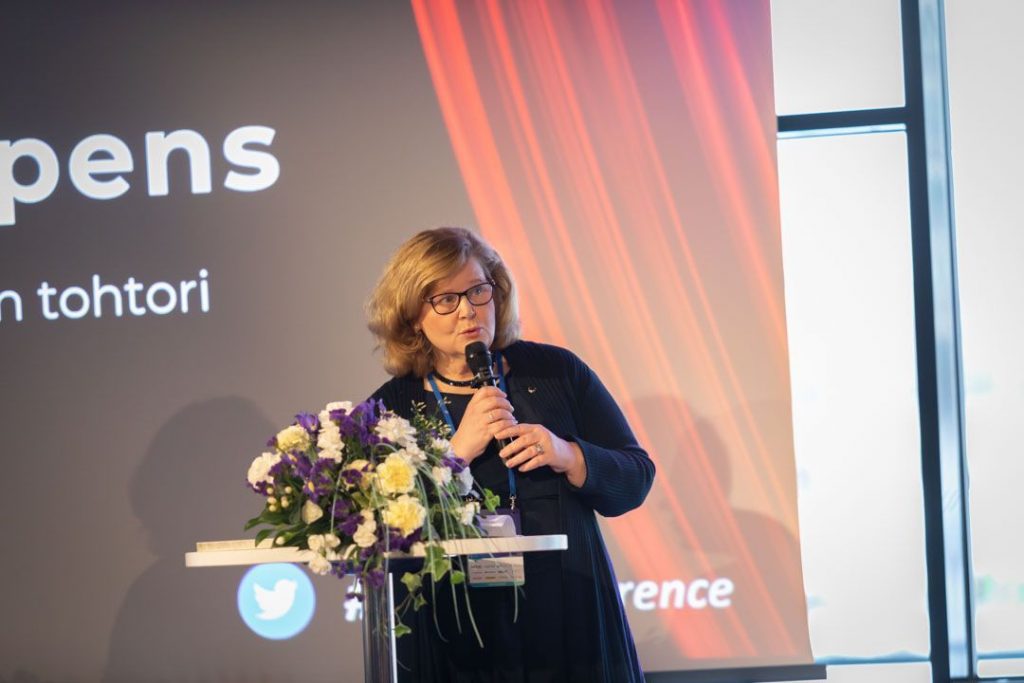
Karen Spens is acknowledged for her significant contributions to the logistics research community in Finland and her dedication to advancing research and education in humanitarian logistics. Her research predominantly focuses on humanitarian logistics, leading to the publication of several books and the co-founding of the Journal of Humanitarian Logistics and Supply Chain Management, as well as the Humanitarian Logistics and Supply Chain Research Institute (HUMLOG Institute). Today, the HUMLOG Institute stands as one of the leading research institutes in the field of humanitarian logistics, collaborating with a broad network industry partners, NGOs, and universities.
With the help of many large research grants, the field of humanitarian logistics has since gained importance within the broader logistics domain. Dr. Spens has co-authored numerous books, book chapters, and articles spanning various journals, including those in logistics and related fields such as disaster studies.
She has also served as the co-editor of the International Journal of Physical Distribution and Logistics Management and held positions on several editorial boards of prominent logistics journals. Dr. Spens has furthered research and cooperation in humanitarian logistics through visiting researcher roles at BI (Norway), MIT (USA), Clark University (USA), and Griffith University (Australia). Additionally, she has been involved in launching the Business Lead Program, an initiative aimed at integrating highly educated immigrants and refugees into the Finnish business culture. The program’s success, recognized with international awards such as The EFMD Excellence in Practice (EiP) Gold Medal, was presented by Dr. Spens at the World Economic Forum (WEF) in Davos in 2019.
Karen Spens earned her Doctor of Science in Business Economics from Hanken School of Economics in 2001. She served as the Dean of Education at Hanken from 2010 to 2015, overseeing the development of the Assurance of Learning process aimed at enhancing student learning outcomes. Additionally, she held the position of Professor of Supply Chain Management and Corporate Geography at Hanken School of Economics. Since autumn 2022, she has served as the President of BI Norwegian Business School.
The award honoring Dr. Spens as the Logistician of the Year 2023 was presented by Anna Aminoff, Chairman of LOGY’s Awards Committee, and Jyri Vilko, Chairman of LOGY’s Board of Directors.
Dr. Spens delivered the following speech upon receiving the Logistician of the Year 2023 Award at the annual LOGY Conference:
“Ladies and gentlemen, esteemed seminar guests,
In 2004, a tsunami struck Southeast Asia, and this year marks the 20th anniversary of this major catastrophe. This event is still vivid in the minds of many Finns and citizens of other countries. It was a shocking and deeply touching event in many ways. In 2006, a colleague of mine popped into my office at Hanken and asked me what I would like to write about for the next NOFOMA conference. NOFOMA is the largest conference for logistics researchers in the Nordic countries, which was held that year at BI Norwegian Business School. I told my colleague that I wanted to write about something that is hardly known at all, and so she asked me, “Have you heard about humanitarian logistics?” I replied that I knew nothing about it.
Therefore, we decided to write an article on humanitarian logistics. At that time, there really were not many articles written on the subject; we found only a small number that used the term. So, we decided to write about it, and thus, our first article, Humanitarian Logistics in Disaster Relief Operations, which was later published in 2007, was born. In the article, we talked about what happened during the tsunami, or perhaps more about what did not happen, and why so many things failed logistically.
Both our NOFOMA paper and our presentation gathered a lot of attention, and the article won the Best Paper Award at the conference. However, the best outcome after the conference was that it sparked collaboration with various actors. Both the International Red Cross and UNICEF quickly joined the collaboration because there was a great need for research on how to better coordinate field work to spend less money on logistics and thus more on helping those in need.
This idea has since been the guiding principle in the field of humanitarian logistics: how to best utilize the available means and methods to allocate funds and other resources in the most effective way for aid work. Subsequently, collaboration with international actors intensified, and in 2008, we established the Humanitarian Logistics Institute at Hanken Business School, in collaboration with the National Defence University. Through projects, many of them international, we gained recognition, and soon after, we established the first scientific publication on humanitarian logistics. The most rewarding aspect of this work for me, especially as a doctor’s daughter, was the sense that our efforts and collaboration truly made a difference.
The Humanitarian Logistics Institute is now one of the most renowned research centers in the world. The world’s first professor of logistics works there, and she is the young researcher who peeked into my office in 2006, Gyöngyi Kovács. I am extremely proud of the work done at the institute and what has been achieved there. During the recent pandemic, they conducted a lot of research on vaccine logistics in a major EU project, and many researchers seek to work and study humanitarian logistics in Finland.
Unfortunately, I haven’t been able to conduct much research myself in recent years. It took a back seat when I transitioned to what is informally referred to as “the dark side,” meaning I started as rector at Hanken in 2015. As far as I understand, I was the first professor of logistics to be appointed as rector. The situation was similar in Norway, where I currently serve as rector. I remember well when I was appointed, the chairman of the board told me that there was much discussion about whether a professor of logistics could handle it, as I didn’t have a strong financial background like a finance professor might. However, I responded that it was precisely my knowledge and expertise in logistics and supply chains that were my strengths. It allows me to think in terms of wholes, and that kind of thinking is essential in my daily work. After all, BI is one of the largest business schools in Europe, with over 20,000 students and four campuses in Norway, as well as one in Shanghai. Logistics is part of our daily lives, and it is also a key subject in many of our programs. In addition, humanitarian logistics has been a central part of the research conducted there, as since we presented our first paper at the conference in 2006, BI has been promoting that research field. Furthermore, BI has done a lot in the field of healthcare logistics, and nowadays, BI is part of Oslo Science City, where we contemplate the future of healthcare, with logistics playing a prominent role.
Reflecting on this journey to the present day, I must admit that twenty years ago, I wouldn’t have believed that our research area would be so unfortunately relevant today. The number of disasters and crises, and the devastation they cause, are part of our daily lives, so there is plenty of work in the field of humanitarian logistics.
And I wouldn’t have believed in 2006 that someday in the future, I would return to BI, this time as rector.
However, what I am certain of is that logistics has equipped me to do my job as rector better, and research in humanitarian logistics has provided insights into what is truly important in life.
Therefore, I would like to end by thanking you for this great honor. I am extremely proud to have been awarded this prize, and I want to thank both LOGY and all those who have supported and encouraged me over the years. I also want to thank my former colleagues at Hanken; thank you all at Hanken, without you, I wouldn’t be where I am today. I also have some of my good colleagues here today from BI. I want to thank you for all your support and for the excellent work you do. You probably didn’t understand much of what I just said, but I will translate for you!
And last but not least, a big thank you to my wonderful family who is here with me today, my mother Vuokko, my husband Seppo, my children Alexandra and Andre, thank you for all the support and for being there.
Warm thanks once again for this wonderful award.”

